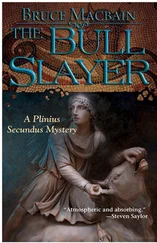Bruce Macbain - Roman Games
Здесь есть возможность читать онлайн «Bruce Macbain - Roman Games» весь текст электронной книги совершенно бесплатно (целиком полную версию без сокращений). В некоторых случаях можно слушать аудио, скачать через торрент в формате fb2 и присутствует краткое содержание. Жанр: Исторический детектив, на английском языке. Описание произведения, (предисловие) а так же отзывы посетителей доступны на портале библиотеки ЛибКат.
- Название:Roman Games
- Автор:
- Жанр:
- Год:неизвестен
- ISBN:нет данных
- Рейтинг книги:3 / 5. Голосов: 1
-
Избранное:Добавить в избранное
- Отзывы:
-
Ваша оценка:
- 60
- 1
- 2
- 3
- 4
- 5
Roman Games: краткое содержание, описание и аннотация
Предлагаем к чтению аннотацию, описание, краткое содержание или предисловие (зависит от того, что написал сам автор книги «Roman Games»). Если вы не нашли необходимую информацию о книге — напишите в комментариях, мы постараемся отыскать её.
Roman Games — читать онлайн бесплатно полную книгу (весь текст) целиком
Ниже представлен текст книги, разбитый по страницам. Система сохранения места последней прочитанной страницы, позволяет с удобством читать онлайн бесплатно книгу «Roman Games», без необходимости каждый раз заново искать на чём Вы остановились. Поставьте закладку, и сможете в любой момент перейти на страницу, на которой закончили чтение.
Интервал:
Закладка:
“Oh, I don’t think…” Lucius began, but Pliny cut him off. “No, my centurion’s right-again.” Pliny was beginning to feel distinctly annoyed at this competent officer. “We may as well know the worst. What images of the gods have you?”
“Dozens, look anywhere in the house. We’ve an altar too, quite nicely carved.”
“Show my men. Bring one of every deity out into the garden, we’ll do it there. And have you an image of Our Lord and God?”
Lucius replied that they kept a small bust of the emperor in the lararium together with their household gods so that they could venerate it everyday.
“Put it with the others and fetch wine and incense. In the meantime, centurion, show me to the slave quarters.”
A rank stench of bodily waste, sweat and terror assaulted Pliny when the door was unbolted. And this, after only two days of confinement. What would it be like after fifteen-if any of the slaves were still alive by then? With a wail of shrieking protestations they cried out that they knew nothing of any plot to murder Master. On their lives, they would have told if they did. And why would anyone do such a thing to Master? Good, kind Master.
Here was the blood and bones of the household, Pliny reflected. They were Levantines, Nubians, Dacians, and Germans. They were litter bearers, torch bearers, bodyguards, and private bully-boys; doorkeepers, footmen, and messengers; valets, butlers and barbers; lady’s maids, dressers, bath women, hair curlers, and masseuses; scullions, chefs, pastry cooks, waiters, cup bearers, and tasters; keepers of the silver, the unguents, the pearls; short-hand writers, hour callers, name rememberers, bed partners of both sexes, musicians, mimes, dancers, and reciters of poetry. Among them also were children, for Verpa permitted his slaves to cohabit on payment of a fee. Pliny saw backs and shoulders seamed with the marks of old floggings and more than one face branded like a felon’s to serve as a warning to the rest. And now, by order of the city prefect, all wore iron collars on which were inscribed the words, “I’m running away-seize me.” The collars were linked together with chains.
Valens banged his staff against the door jamb and bawled at them to shut their yaps.
When there was some semblance of quiet, Pliny spoke to them, while breathing as little of the fetid air as he could. “I am going to ask you to do something very easy, to sacrifice to the gods and our emperor, only that. No one will be tortured, I promise you. We have reason to think that there may be one, or a small number, of depraved madmen among you, devotees of a vicious cult. If that turns out to be true, then maybe, I can promise nothing yet, maybe the rest of you can be saved.”
Pliny heard with genuine surprise these words come from his lips. Like anyone with a smattering of Greek philosophy, he knew that slavery was against nature. There was no difference between a freeman and a slave except a cruel twist of fate. But as far as Roman law was concerned, the slave was not a man at all but a “speaking tool,” possessing no rights. Pliny wasn’t sure quite when it had occurred to him that his purpose here was to save these men and women from an unjust death. It certainly had not been in his mind two mornings ago when news of the crime had alarmed the city. Valens looked at his superior, incredulous that anyone would talk to slaves this way, while the slaves resumed shrieking their innocence.
The garden was quite lovely: boxwood hedges, tall elms, and fruit trees; stone benches round a pool where fountains splashed. Here a miscellany of divine images had been assembled. There was, besides the head of Domitian Lord and God, a bronze figurine of Hercules, a lovely marble Diana, a bust of Jupiter, a statuette of Isis, and the inevitable statue of Priapus, godling of vegetation and sex, who leered mischievously here as in every Roman garden.
The slaves were brought out in batches of ten, shoved along by the troopers, with swords drawn, who cursed at them and struck them with the flat of their blades. Eager to prove their piety, they stumbled forward one by one, dropped incense and wine on the altar fire and mouthed a prayer at Pliny’s dictation.
Finally it was the turn of Pollux, whom Pliny had saved for last, and four others who clung to the man: an older woman, his mate, said Lucius, and two young women and a boy. All of them tried to shelter behind the boxer’s broad back. There was fear in their eyes. Pollux’s lips moved soundlessly. If it was a prayer, it was not directed at those lifeless statues arrayed before them. Like a statue himself, his ugly face unmoving as a mask, Pollux stood before the altar and did nothing with the incense and wine cup handed to him. For a long moment there was dead silence save for the chirping of song birds in the trees.
Then, before Pliny could stop him, Lucius dashed forward and struck the slave in the face with all his strength. Pollux, who had been hit by tougher men than Lucius in his time, did not flinch but continued to look straight ahead of him. His fellow slaves stood by, stunned to silence. Then, one after another, they began to murmur: “Atheist, traitor, you’ll get us all killed!”
One of the young women broke and ran forward to the altar, crying “Please, Masters, I’ll burn the incense!” But Pollux caught her by the arm and pulled her back. “Sister, be brave, in the name of the True God.” In an agony of doubt, the girl looked from the altar to Pollux’s face and back again. The older woman came and put her arms around her and drew her back into their circle. The murmurs of the other slaves rose to angry, menacing shouts. The City Troopers cast nervous looks at their centurion. “Murderer of my father!” screamed Lucius. “Heat irons. I’ll have the truth out of him!” Pliny felt the situation slipping out of control. “I give the orders here,” he warned Lucius. “Stand back.” The young man looked mutinous.
Stepping close to Pollux, Pliny said in a low voice, “You have put yourself and these others in grave danger. I give you one day to think it over.” The boxer only stared back impassively.
“Centurion, take them back to their quarters,” Pliny ordered, “and double the guard.” And to Lucius he confided, “I am encouraged that the poison seems to have spread to only a few. I wish I could release the rest of your slaves now but I haven’t the authority. They will have to remain under guard until the Games are over and a trial before the prefect can be conducted. No doubt, you have other slaves in your country estates. By all means bring them in. And now,” he said, “I am leaving.” The urge to be gone from this place was suddenly overwhelming.
Lucius expressed sullen thanks.
“But sir,” Valens interrupted. “The lady of the house, Turpia Scortilla. Shouldn’t you have a word with her?”
“ Mehercule,” cried Pliny in exasperation, “haven’t I done enough here today?”
“It’s procedure, sir. She might just know something.” He used the tone of voice one would in speaking to a dull child.
Pliny let out a sigh. “Conduct me to the lady, then.”
Standing guard outside her chamber door, the dwarf Iarbas tried to block their way, hopping from one flat foot to the other and mouthing insults at them. He was the most extraordinary creature that Pliny had ever seen: a black dwarf, fat-headed, with tiny mole’s eyes, a big belly, and short, muscular legs. Golden torques and armlets gleamed against his dusky skin. On his shoulder perched a monkey, equally bejeweled, and making savage grimaces at them with yellow, pointed teeth. Valens pushed man and beast roughly aside. “We tried locking this one up with the others,” he explained, “but the lady was so distressed we let him loose. Seems harmless enough, the ugly little imp.”
Читать дальшеИнтервал:
Закладка:
Похожие книги на «Roman Games»
Представляем Вашему вниманию похожие книги на «Roman Games» списком для выбора. Мы отобрали схожую по названию и смыслу литературу в надежде предоставить читателям больше вариантов отыскать новые, интересные, ещё непрочитанные произведения.
Обсуждение, отзывы о книге «Roman Games» и просто собственные мнения читателей. Оставьте ваши комментарии, напишите, что Вы думаете о произведении, его смысле или главных героях. Укажите что конкретно понравилось, а что нет, и почему Вы так считаете.












